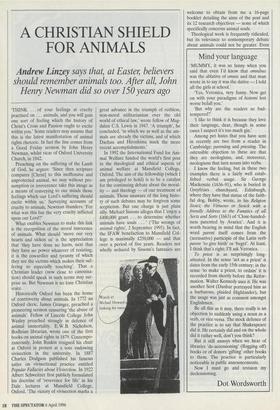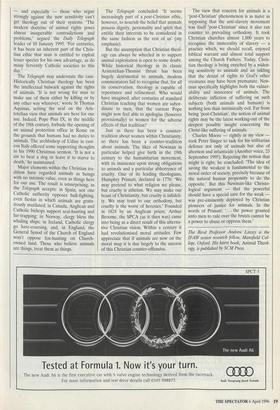A CHRISTIAN SHIELD FOR ANIMALS
Andrew Linzey says that, at Easter; believers
should remember animals too. After all, John Henry Newman did so over 150 years ago
`THINK . . . of your feelings at cruelty practised on . . . animals, and you will gain one sort of feeling which the history of Christ's Cross and Passion ought to excite within you.' Some readers may assume that this is the latest manifestation of animal rights rhetoric. In fact the line comes from a Good Friday sermon by John Henry Newman, whilst vicar of Oxford University Church, in 1842.
Preaching on the suffering of the Lamb of God, he argues: 'Since then scripture compares [Christ] to this inoffensive and unprotected animal, we may without pre- sumption or irreverence take this image as a means of conveying to our minds those feelings which our Lord's suffering should excite within us.' Surveying accounts of cruelty to animals, Newman thunders: 'For what was this but the very cruelty inflicted upon our Lord?' What enables Newman to make this link is the recognition of the moral innocence of animals. What should 'move our very hearts and sicken us' is the appreciation that 'they have done no harm, next that they have no power whatever of resisting; it is the cowardice and tyranny of which they are the victims which makes their suf- fering so especially touching'. That a Christian leader (now close to canonisa- tion) should speak in such terms may sur- prise us. But Newman is no lone Christian voice.
Historically Oxford has been the home of controversy about animals. In 1772 an Oxford cleric, James Granger, preached a pioneering sermon censuring 'the abuse of animals'. Fellow of Lincoln College John Wesley preached strongly in defence of animal immortality. E. W.B. Nicholson, Bodleian librarian, wrote one of the first books on animal rights in 1879. Contempo- raneously, John Ruskin resigned his chair at Oxford in protest at a vote endowing vivisection in the university. In 1887 Charles Dodgson published his famous satire on vivisectional practice entitled Popular Fallacies about Vivisection. In 1922 Albert Schweitzer first publicly formulated his doctrine of 'reverence for life' in his Dale lectures at Mansfield College, Oxford. 'The victory of vivisection marks a great advance in the triumph of ruthless, non-moral utilitarianism over the old world of ethical law,' wrote fellow of Mag- dalen C.S. Lewis in 1947. 'A triumph', he concluded, 'in which we as well as the ani- mals are already the victims, and of which Dachau and Hiroshima mark the more recent accomplishments.'
In 1992 the International Fund for Ani- mal Welfare funded the world's first post in the theological and ethical aspects Of animal welfare at Mansfield College, Oxford. The aim of the fellowship (which I am privileged to hold) is to be a catalyst for the continuing debate about the moral- ity — and theology — of our treatment of animals. Those unaware of the long histo- ry of such debates may be forgiven some scepticism. But one charge is just plain silly. Michael Sissons alleges that I 'enjoy a £400,000 grant . . . to determine whether animals have souls . . . ' (`The wrongs of animal rights', 2 September 1995). In fact, the IFAW benefaction to Mansfield Col- lege is maximally £250,000 — and that over a period of five years. Readers not wholly seduced by Sissons's fantasies are welcome to obtain from me a 16-page booklet detailing the aims of the post and its 12 research objectives — none of which specifically concerns animal souls.
Theological work is frequently ridiculed, but its relevance to contemporary debate about animals could not be greater. Even — and especially — those who argue strongly against the new sensitivity can't get theology out of their systems. 'The modern doctrine of animal rights poses almost insuperable contradictions and problems,' argued the Daily Telegraph leader of 10 January 1995. 'For centuries, it has been an inherent part of the Chris- tian ethic that man is entitled to exploit lesser species for his own advantage, as do many fervently Catholic societies to this day.'
The Telegraph may understate the case. Historically Christian theology has been the intellectual bulwark against the rights of animals. 'It is not wrong for man to make use of them either by killing or by any other way whatever,' wrote St Thomas Aquinas, setting the seal on the Aris- totelian view that animals are here for our use. Indeed, Pope Pius IX, in the middle of the 19th century, forbade the opening of an animal protection office in Rome on the grounds that humans had no duties to animals. The archbishop of Udine in east- ern Italy offered some supporting thoughts in his 1990 Christmas sermon. 'It is not a sin to beat a dog or leave it to starve to death,' he maintained.
Major elements within the Christian tra- dition have regarded animals as beings with no intrinsic value, even as things here for our use. The result is unsurprising, as the Telegraph accepts: in Spain, not one Catholic authority opposes bull-fighting, even fiestas in which animals are gratu- itously mutilated; in Canada, Abglican and Catholic bishops support seal-hunting and fur-trapping; in Norway, clergy bless the whaling ships; in Ireland, Catholic clergy go hare-coursing, and, in England, the General Synod of the Church of England won't oppose fox-hunting on Church- owned land. Those who believe animals are things, treat them as things. The Telegraph concluded: 'It seems increasingly part of a post-Christian ethic, however, to nourish the belief that animals possess dignity, personality and spirit that entitle their interests to be considered in the same fashion as the rest of us' (my emphasis).
But the assumption that Christian theol- ogy can always be wheeled in to support animal exploitation is open to some doubt. While historical theology in its classic Aristotelian-Thomist thrust has been hugely detrimental to animals, modern commentators fail to recognise that, for all its conservatism, theology is capable of repentance and refinement. Who would have imagined, after centuries of standard Christian teaching that women are subor- dinate to men, that the current Pope might now feel able to apologise (however provisionally) to women for the adverse effects of that tradition?
Just as there has been a counter- tradition about women within Christianity, so there has been a counter-tradition about animals. The likes of Newman in particular helped give birth in the 19th century to the humanitarian movement, with its insistence upon strong obligations to animals and a particular abhorrence of cruelty. One of its leading theologians, Humphry Primatt, declared in 1776: 'We may pretend to what religion we please, but cruelty is atheism. We may make our boast of Christianity, but cruelty is infideli- ty. We may trust to our orthodoxy, but cruelty is the worst of heresies.' Founded in 1824 by an Anglican priest, Arthur Broome, the SPCA (as it then was) came into being as a direct result of this alterna- tive Christian vision. Within a century it had revolutionised moral attitudes. Few appreciate that if animals are now on the moral map it is due largely to the success of this Christian counter-offensive. The view that concern for animals is a `post-Christian' phenomenon is as naive as supposing that the anti-slavery movement was itself 'post-Christian' since it also ran counter to prevailing orthodoxy. It took Christian churches almost 1,800 years to recognise the immorality of slavery — a practice which, we should recall, enjoyed biblical warrant and almost total support among the Church Fathers. Today, Chris- tian theology is being enriched by a widen- ing sensitivity to animals and an inkling that the denial of rights to God's other creatures may have been premature. New- man specifically highlights both the vulner- ability and innocence of animals. The deliberate infliction of suffering on such subjects (both animals and humans) is nothing less than intrinsically evil. Far from being 'post-Christian', the notion of animal rights may be the latest working-out of the deepest possible insight concerning the Christ-like suffering of animals.
Charles Moore — rightly in my view took Peter Singer to task for his utilitarian defence not only of animals but also of abortion and infanticide (Another voice, 23 September 1995). Rejecting the notion that might is right, he concluded: 'The idea of saving the weakest is fundamental to the moral order of society, precisely because of the natural human propensity to do the opposite.' But this Newman-like Christo- logical argument — that the powerful should have a special care for the weak was pre-eminently deployed by Christian pioneers of justice for animals. In the words of Primatt: `. . . the power granted unto men to rule over the brutes cannot be a power to abuse or oppress them.'
The Revd Professor Andrew Linzey is the IFAW senior research fellow, Mansfield Col- lege, Oxford. His latest book, Animal Theol- ogy, is published by SCM Press.



























































 Previous page
Previous page